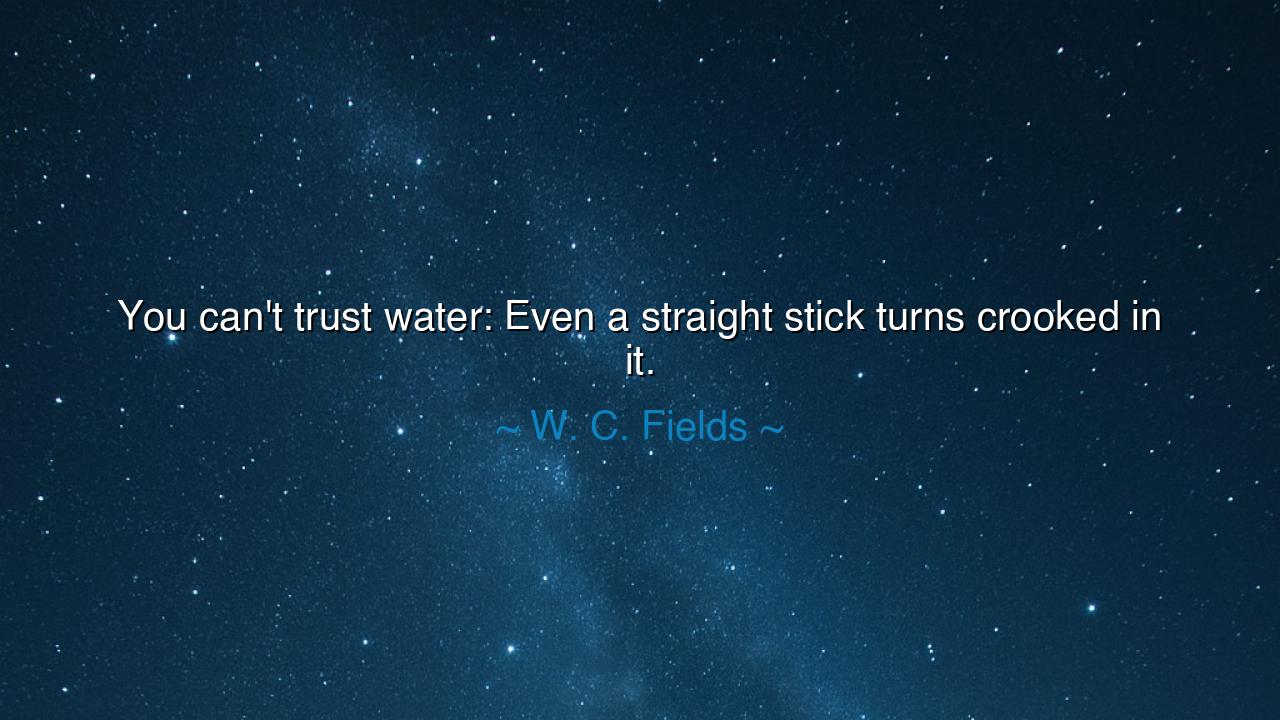
You can't trust water: Even a straight stick turns crooked in






The words of W. C. Fields—“You can’t trust water: Even a straight stick turns crooked in it”—are delivered with humor, yet they hold a wisdom as sharp as any proverb of old. In this brief observation, Fields speaks not only of the playful trick of light upon water but also of the deeper reality of illusion: that things are not always as they appear, and that the senses themselves may betray us. The straight stick, when placed in water, seems to bend, not because it has changed, but because perception has been distorted. Thus, Fields warns us, with wit and irony, that we must be wary of what appears before our eyes, for even the most trustworthy object may seem false when seen through a deceptive medium.
The origin of this saying rests in both science and satire. Fields, known for his wit and mistrust of easy appearances, took a simple physical phenomenon—the refraction of light in water—and clothed it in moral truth. In water, the stick is not truly crooked, but it seems so; and in life, men, words, and events are often twisted not in reality, but in the way they are perceived. His jest contains the wisdom of philosophers: that perception is not reality, and that to rely only on what is seen or heard without discernment is to walk upon treacherous ground.
History gives us mighty examples of this truth. Consider the tale of the Trojan Horse. To the eyes of the Trojans, it was a gift, a symbol of victory, a marvel to be admired and welcomed. Yet the appearance was false: within its hollow frame lurked their doom. What seemed to be a prize was in truth a prison for their destruction. The Trojans, like those who gaze upon a stick in water, trusted the appearance, and their city fell in fire. The lesson is eternal: illusions can destroy nations as easily as they deceive the eye.
But Fields’ words also speak more personally. How often do we judge others by appearances, mistaking crookedness for truth or truth for crookedness? A man of honor may seem harsh, and we call him cold; a deceiver may appear charming, and we call him good. Like the stick in water, their essence has not changed, but our perception has been bent by the medium through which we see them—our prejudice, our ignorance, or our desire. To trust appearances without wisdom is to be led astray.
The ancients knew this well. Plato taught that the world perceived by the senses is but a shadow, a reflection of higher realities, distorted and fleeting. The Hebrew scriptures warn that “man looketh on the outward appearance, but the Lord looketh on the heart.” And Confucius urged his followers to seek substance over show. Fields, though jesting, joins this long chorus: appearances deceive, and what seems straight may appear bent, not by its nature but by the eyes that behold it.
The meaning then is clear: we must cultivate discernment. To live wisely is to recognize that what we see may not be what is. The waters of life—circumstance, emotion, rumor, ambition—bend the truth before our eyes. The wise man does not rush to judgment but waits for the waters to clear. He does not trust first impressions alone, but tests, questions, and seeks the deeper reality. In this patience is safety; in haste, destruction.
The lesson for us is this: be cautious with appearances. When you see what seems crooked, ask if the waters of perception have bent it. When you hear words sweet to the ear, ask if they mask a bitter heart. Do not be cynical, but be discerning. Practically, this means pausing before judgment, seeking evidence before conclusion, and weighing substance above show. It means resisting the seduction of illusions—whether in politics, in love, or in daily dealings—and holding fast to truth even when it lies hidden beneath the waves.
Thus, the playful wisdom of W. C. Fields endures: “You can’t trust water: Even a straight stick turns crooked in it.” Let it remind us that life is filled with deceptive reflections, and that true strength lies in seeing beyond them. Appearances may twist the truth, but wisdom straightens it again. Trust not the water, but the reality that lies beyond it, and you will walk more surely through the shifting illusions of this world.






AAdministratorAdministrator
Welcome, honored guests. Please leave a comment, we will respond soon